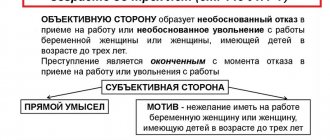Concept and grounds for termination of marriage
The RF IC sets out the concept and grounds for ending a marriage. Thus, the termination of the legal fact of the existence of a marital relationship is the termination of a marriage. This process must be conditioned by such legal events that are significant and change legal relations.
The Family Code defines the grounds for termination of marriage:
- recording the fact of death of one of the spouses;
- declaring one of them dead;
- carrying out the divorce procedure based on the application of the parties;
- divorce at the request of one of the spouses in the case of: recognition by the court as missing; recognition by the court as incompetent; conviction for committing a crime to imprisonment for a term of more than three years. (Part 2 of Article 19 of the RF IC).
- divorce in court
- making a court decision on the invalidity of a marriage.
There are no other grounds for ending a marriage.
The moment of grounds for the termination of marriage upon the death of the second spouse or recognition of him as deceased is considered to be the date of his actual death or the day the corresponding court decision enters into force.
Both grounds for termination of marriage do not require special registration of the terminated marriage.
Civil and family legislation allows for the possibility of returning a person declared dead. So, the court decision will be canceled and the marriage restored. Thus, the grounds for ending the marriage will no longer exist.
Family unions cannot be restored in the case where the second spouse is already in another official marital relationship.
Legal consequences
Simultaneously with the termination of the marriage, the legal relations of the former spouses also cease. There are some exceptions:
- legal relations continue if alimony is paid;
- legal relations can continue if there are property points of contact.
If the union is terminated on the basis of divorce (through the court), the division of the property did not take place, and there is no agreement on division, then in some cases the former spouses continue to use the property together. For example, if real estate was acquired during marriage, and the former family is the shared owner, then without dividing this property, the spouses can continue to own this property on a shared basis.
With a divorce, both parents are not released from the responsibility to participate in the upbringing and maintenance of children.
In the event of the death of one of the spouses (or judicial recognition as deceased), the living spouse may participate in the inheritance issue. But if a divorce occurs, then after the death of the former spouse, the second has no rights to inheritance.
Grounds for divorce
The definition of grounds for divorce means the termination of family legal relations, which is carried out through judicial proceedings or a simplified procedure. The main thing is that among the exhaustive list of grounds for divorce established by the provisions of the RF IC, it is necessary to note the following grounds for termination of marriage:
- the presence of mutual consent to divorce among married persons;
- submission by one of the spouses of an application to the justice authorities, if the second spouse is recognized as missing, incompetent or guilty of committing a crime, the punishment for which is three or more years of imprisonment;
- submission by the guardian of an application to recognize the ward (who acts as a spouse) as incompetent.
For each presented basis for the termination of a marriage, there is a volume of features, the specificity of which allows us to speak of the termination of a marriage as a complex legal process.
The RF IC directly establishes cases in which divorce can be carried out according to a simplified procedure by the civil registry office. This requires mutual consent of the spouses and the absence of a dispute about children and property.
Any obstacle to divorce entails mandatory legal proceedings.
Responsibilities of a father who left his family
The Family Code defines the responsibilities of the father after a divorce if the children remain living with their mother.
In addition to paying alimony, he must:
- participate in upbringing, spend time with children, if his rights are not limited by a court decision;
- communicate with your ex-wife to make the right decision about the fate of the child;
- help in difficult situations: through means, physically, psychologically;
- partially pay the costs of children's education;
- contribute 50% of the funds needed for the treatment of the baby.
Death or recognition of one of the spouses as deceased
The termination of a marriage is possible as a result of death. In this case, the date of termination of the marriage will be considered the day on which the second spouse died.
Positions si. 48 of the Civil Code of the Russian Federation provide a list of grounds, the presence of which allows one to recognize a spouse as deceased. These include:
- lack of information about the person’s place of residence at his place of residence for 5 years;
- absence of such information for 6 months, in the event that the person went missing under such circumstances that could threaten him with death. In addition, such circumstances may give reason to believe that the death of a person occurred as a result of an accident;
- disappearance of a serviceman or other person who was in a war zone, if after the end of the war he did not return to his previous place of residence within 2 years.
Consideration of this issue is entrusted to the justice authorities. The second spouse or other relatives of the presumably deceased person, as well as the prosecutor, have the right to petition for an appropriate decision.
Both death and the recognition of a person as deceased are an objective factor for terminating a marriage in a simplified manner, through the registry office.
What is divorce of spouses
Official divorce is the dissolution of a marriage between spouses. It is not enough to simply move to different apartments, stop communicating and run a joint household. Divorce means that it occurs in the prescribed manner, with the receipt of official documents confirming that the marriage is terminated.
Only those spouses who entered into it through the registry office can dissolve a marriage. The word divorce is not used in family law; it is colloquial. It is correct to say, and even more so to write in official documents, divorce.
A marriage can be ended not only by its dissolution; the marriage ends in the event of the death of the spouse, and in some cases the marriage can be declared invalid.
Divorce at the request of one or both spouses
A simplified procedure for divorce by filing an application with the civil registry office is possible if there is mutual consent of the spouses and they do not have minor children. In this case, the existence of property disputes subject to consideration by the justice authorities does not matter.
In this case, the parties must submit a joint application to the marriage registration authorities expressing their desire for divorce. The absence of a mutual statement entails the need for a judicial procedure. Based on the joint application, after a month from the date of its filing, the marriage is dissolved, which requires the presence of at least one party.
The fact of divorce is reflected in the deed record, on the basis of which a certificate is issued.
This procedure for dissolving a marriage in which there are no minor children is the most civilized, less expensive in terms of time and money.
How is property divided when a marriage breaks down?
The latest edition of the Family Code of the Russian Federation on divorce stipulates the process of dividing property that spouses have acquired together. It can be done at the request of the husband or wife, as well as at the request of the creditor.
Basic principles of property division:
- In the family code, in a divorce without children, the common capital of the parties can be divided by their agreement. Everything acquired during marriage is confirmed by a notary.
- If disputes arise over property rights, both spouses after divorce should go to court to assign a portion of the property. At the request of the spouses, he determines what will be transferred to each of them. If a wife or husband is assigned property at a value higher than their share, the other may be awarded the missing compensation - monetary or otherwise.
- The court may recognize marital property acquired by either estranged spouse or upon the termination of the relationship as personal property. Items purchased specifically for children are not subject to division and, without any compensation, are transferred to the spouse with whom the offspring live. Contributions made by both parties in the name of their minor children belong only to the latter.
- The limitation period for the claim of the parties after the dissolution of the marriage in court for the distribution of the common wealth expires after three years.
Grounds for ending a marriage in court
A marriage is subject to dissolution through the use of justice if the spouses have common minor children, or in the absence of the consent of one of the spouses to dissolve the marriage. An exception to this rule is cases when the second spouse is declared missing, incompetent, or deprived of liberty by a court sentence for a period of 3 or more years.
The grounds for ending a marriage are the breakdown of the family, which can be considered obvious and which is contrary to the interests of the married persons, their children and society. In this case, the consent of both spouses is not required. The court only establishes the fact that it is impossible to continue family relationships. For example, a party filing an application in court indicates dissimilarity in character as the reason. The court appoints a reconciliation procedure (at the discretion of the court, for a period of up to 3 months), after which the opinions of the parties are heard again and, even if one party does not want to continue the relationship, the marriage is subject to dissolution.
Along with making a decision on this issue, the court determines the order of residence of the minor, examines the issue of the property dispute and the financial support of the parties.
The moment of termination of marriage will be recognized as the entry into legal force of the decision. The right to enter into a new marriage for former spouses arises immediately from this date after receiving the appropriate certificate, which is issued by the registry office.
What issues does the court decide?
In case of divorce, the Family Code of the Russian Federation defines the issues to be resolved in court by former spouses:
- Where will minors live, what is the procedure for paying and the amount of alimony for them and their spouse if he is disabled. How to divide common family property.
- If there is evidence that the rights of children or a spouse are being violated, the duties of the court include:
- resolving the issue of residence of minors after divorce;
- designation of the parent with whom the children will live and the amount of child support for them;
- determination, at the request of the mother or father, of the amount of funds for the maintenance of minors to those who have the right to it.
- The Family Code of the Russian Federation 2021 on divorce, when making a decision, if there are other persons demanding their share in the joint property of the spouses, allows the court to distinguish this procedure as a separate proceeding.
Procedure and grounds for termination of marriage
State registration of marriage and its dissolution is entrusted to the registry office.
The dissolution of a marriage in which the spouses do not have a minor child occurs in a simplified manner if these persons apply to the registration authority with a joint application, thereby expressing a mutual desire to terminate the marital relationship. Divorce will occur after a month, from the date of filing a joint application, of which the registry office will issue a certificate to the parties.
The absence of mutual desire or the presence of minor children entails the use of judicial procedures to consider the issue of dissolution of the union of citizens.
The legal process is based on a statement submitted by one of the parties to the legal relationship. The court may give the parties a period of time for reconciliation, after which it will hear them on the issue of the possibility of continuing the marriage. A court decision that has entered into legal force must be sent to the registry office for state registration of the fact of dissolution of the marriage. Upon such registration, a state certificate is issued.
The moment of termination of marriage will be recognized as the entry into legal force of the decision. The right to enter into a new marriage for former spouses arises immediately from this date after receiving the appropriate certificate, which is issued by the registry office.
Author of the article
If the spouse's information is missing for a year
If nothing is known about the whereabouts of the spouse during the year, the second spouse or other interested parties may recognize him as missing in court.
If it is impossible to determine the day on which the last information about the missing person was known, then the period for calculating the recognition of a person as missing begins to run on the first day of the month that follows the one in which the last information about him was received. If it is impossible to determine the month, then the first day of January of the next year is taken.
When preparing a statement of claim, it is necessary to provide evidence that during the year nothing was known from the spouse at his last place of residence. The materials of the search case can serve as a valid basis. Therefore, before going to court, you should contact the police to search for your spouse. Evidence may also include testimony from witnesses.
The claim is created in simple written form, taking into account the requirements and rules for such documents.
After filing a claim in court, during the process all the required circumstances of the case will be established. If the court decides that the evidence and arguments presented are sufficient, a decision will be made.
Documents can be submitted to the court by a trusted person on the basis of a properly executed power of attorney. Such a person has the right to represent the interests of his client throughout the entire trial.
What factors are not valid arguments in favor of dissolving a marriage?
If one of the parties is against divorce, and the second files a lawsuit, justifying its actions with arguments such as, for example, different characters or simply unwillingness to continue living together, the court, in order to preserve the family, may not accept these frivolous arguments as weighty and give to the spouses in accordance with paragraph 3 of Art.
22 RF IC time from one to three months for reconciliation. Any arguments of the spouse presented to the court to justify the divorce cannot be accepted by the court as valid if his wife is pregnant or they are raising an infant under 12 months. In this situation, in accordance with the provisions of Article 17 of the RF IC, the spouse’s statement of claim will not be accepted at all. Divorce in this situation is possible after the specified reasons disappear or if the woman herself is the plaintiff.
Spouses must understand all these nuances if they wish to file an application with the registry office or a lawsuit in court for divorce and simultaneous collection of alimony. That is why it is best to entrust such work to an experienced family relations lawyer, who will prepare the necessary documents and correctly substantiate his client’s arguments, which will lead to a quick and psychologically painless completion of the divorce process.
Digital library
Social work / Family law / 2.6 TERMINATION AND DISSOLUTION OF MARRIAGE
Even the strongest family
—
no stronger than a house of cards
Halifax D.S.
The concept of “termination of marriage” is much broader than the concept of “dissolution of marriage”, and the former includes the latter. These terms (“termination of marriage” and “dissolution of marriage”) are not identical. They relate as a whole (termination of marriage) and a part (dissolution). The concept of “termination of marriage” includes the termination of a marriage due to the death of a spouse, declaring him dead and dissolution of marriage, which, in turn, can occur both in the registry office and in court.
End of marriage
The actual termination of marital relations without proper registration of a divorce does not entail the termination of the marriage, regardless of the time of separation of the spouses.
The most significant innovation in this norm is the recognition of the possibility of divorce at the request of the guardian of the spouse recognized by the court as incompetent. This rule follows from the content of Art. 29, 31 and 32 of the Civil Code of the Russian Federation. According to the previous rules, no one other than the spouses themselves could initiate proceedings for divorce. Termination of a marriage due to the death of a spouse or declaring him dead does not require a special procedure.
It is sufficient to submit to the civil registry office a document certifying the death of the spouse, or a court decision declaring him dead. Registration of one of these events gives the right to the other spouse to enter into a new marriage.
The death of a spouse or declaring him dead and the subsequent termination of the marriage eliminates almost all relationships that arose during the marriage (common property, right to maintenance, etc.), only some of them are preserved (surname, inheritance are preserved).
When a marriage is dissolved at the request of one or both spouses in court or in the registry office, all legal relations existing during the marriage between them are equally terminated, except for mutual alimony of the spouses, if they are due to one of them, and relations arising in connection with the established property regime of the spouses.
Article 17 of the RF IC is aimed at protecting the pregnant wife and mother of the child. The article reproduces the rule that prohibits a husband from initiating a case in court without the consent of his wife and applying for a divorce to the registry office, and only the right of the husband is limited in these circumstances. In these cases, the wife fully retains her right to initiate proceedings for divorce at any time. This rule also applies in cases where the child was stillborn or did not live to be one year old. A husband who initiates a case and obtains his wife’s consent to divorce needs her written confirmation. Moreover, such consent can be expressed both in an independent and in a joint application for divorce, or in the form of an inscription on the husband’s application. If the husband’s application was accepted for consideration without the wife’s consent, the proceedings are terminated.
Divorce is carried out in the civil registry office, and only in cases provided for in Art. 21 - 23 of the RF IC, - in court. If the spouses’ application for divorce is subject to resolution by the civil registry office, it is considered and resolved by the civil registry office at the place of residence of the spouses or, by mutual agreement, at the place of residence of any of them. The procedure for registering a divorce is determined by the general rules of civil registration. In these cases, the civil registry office does not clarify the circumstances of the case, interview witnesses, or review evidence.
The current judicial procedure for divorce is established by Art. 21 – 23 RF IC.
Divorce in the civil registry office
Article 19 of the RF IC establishes two conditions for a divorce to be processed by the registry office: mutual consent of both spouses to divorce and the absence of common minor children, including adopted ones. The presence of children they do not have in common is not an obstacle to considering a divorce case in the registry office. Consent to divorce in these cases must be expressed in writing by filing a joint or two separate statements. This norm is imperative in nature and excludes the possibility of spouses filing a claim for divorce in court, except in cases provided for in Art. 21 IC of the Russian Federation. The absence of minor children is confirmed by the presentation of relevant documents (passports).
The civil registry office carries out a divorce at the request of one of the spouses if the other spouse is recognized by the court as missing. The procedure for recognizing a citizen as missing is regulated by Art. 42 – 44 of the Civil Code of the Russian Federation, which provide that a citizen may be recognized as missing by the court if there is no information about his place of residence at his place of residence for one year. The guardianship and trusteeship body appoints a manager of the property of this person, funds are allocated from this property for the maintenance of persons whom he had to take care of.
hold. It is possible to cancel the decision to recognize a person as missing if he appears and restore the marriage (see Article 26 of the RF IC).
The civil registry office also dissolves a marriage with a person declared incompetent by the court. Limitation of legal capacity should be distinguished from incapacity, which cannot be the basis for applying the rules of the RF IC. To consider the case in the civil registry office, it is sufficient to present a copy of the relevant court decision.
Another case where it is possible to dissolve a marriage in the civil registry office (even if there are common minor children) is when the other spouse is sentenced to imprisonment for a term of over three years for committing a crime. This means that a court verdict that has entered into legal force on the imprisonment of one of the spouses for three years or more is sufficient for the other spouse to file an application to the registry office for divorce, and no deadlines for filing the application are established here.
Compared to previous legislation, the RF IC has reduced the period between filing an application for divorce and the dissolution of marriage itself with the issuance of a certificate by the civil registry office from three months to one month.
The procedure for registering divorce and issuing a certificate of this is carried out by the registry office in accordance with the general procedure for registering acts of civil status established for this purpose. For the state registration of divorce, including the issuance of a certificate, with the mutual consent of spouses who do not have minor children, a state fee is collected.
A marriage between spouses can be restored under certain conditions.
Article 26 of the RF IC seriously changes the previously existing order. The appearance or discovery of the place of residence of a person declared dead or missing by the court, of course, entails the cancellation of the court's decision on divorce. The marriage that existed between spouses can be restored only upon their joint application. The marriage is restored provided that the other spouse has not entered into a new marriage. Recovery occurs automatically. The spouses should not take any formal actions other than filing a joint application.
Divorce in court
The judicial procedure for divorce is provided, first of all, if the spouses have common minor children. The case is also accepted for consideration by the court in the case where there is no consent of one of the spouses for divorce. The court, simultaneously with the divorce, can resolve all related issues - about children, property, maintenance. In cases of divorce in the civil registry office, such issues can be resolved by the court both before and after consideration of the divorce case in the civil registry office.
It seems very difficult to resolve the issue of transferring a divorce case to court when one of the spouses, without directly objecting to the right granted to him by law to dissolve the marriage in the registry office, avoids filing an application with the registry office, does not appear for registration, or commits other actions that impede registration of divorce. In such cases, the case is still subject to trial.
The question of the procedure for divorce is one of the most difficult in cases of dispute between spouses. The Family Code of the Russian Federation does not provide a list of grounds in the presence of which a marriage should or can be dissolved, and repeats the previously valid legislative wording about the impossibility of further living together of spouses and preserving the family.
When one of the spouses objects to its termination, the court takes measures for the possible reconciliation of the spouses, setting a period for possible reconciliation of the spouses within three months (according to the Code of Law of the RSFSR, it was 6 months). It is important that the innovation of the RF IC is the provision that divorce is carried out not only in cases where the court recognizes that measures to reconcile the spouses were unsuccessful, but also when the spouses (one of them) insist on dissolution of the marriage. Thus, the final decision to maintain or terminate the marital relationship remains a personal matter for either spouse.
In the case where both spouses with minor children agree to divorce, it is nevertheless carried out in court in order to protect the rights and interests of the children. At the same time, the reasons for which the spouses initiated divorce proceedings are not clarified by the court. This also applies to spouses whose lawsuit is caused by one of them evading a divorce through the civil registry office.
The period established by the RF IC of one month from the date the spouses submit an application to the court for divorce before its dissolution by the court limits only the possibility of an earlier consideration of the case and is equal to the period established for registering a divorce with the registry office.
Moment of termination of marriage
The moment of termination of marriage is the implementation of the law. Its establishment determines the future relationship of the former spouses.
A legal marriage dissolved by the civil registry office is considered terminated from the date of registration of the dissolution of the marriage in the civil registration book.
The moment of termination of a marriage when dissolved in court is the moment the court decision enters into legal force. Previously, the termination of a marriage upon its dissolution both in the registry office and in court occurred only after the divorce was registered in the deed register. This gave rise to legal uncertainty, since the period during which spouses who received a court decision on divorce could register the divorce with the registry office was unlimited. The three-year period for enforcement of court decisions was not applied in cases of divorce. After the court's decision on divorce, each spouse could obtain a divorce certificate at any time. At the same time, the other spouse was not even informed about this. Marriage formally existed, but in a very vague form, which led to a significant infringement of the rights and interests of the spouses (one of them).
In accordance with the Civil Code of the Russian Federation, divorce is subject to state registration with the civil registry office. After the court decision enters into legal force, the court within three days sends an extract from this decision to the civil registry office to register the divorce in the deed register. However, for former spouses, registration of divorce has legal significance: without receiving a certificate of divorce, they have no right to enter into a new marriage.
In what cases should the judicial authority not be interested in the reasons for the dissolution of a marriage?
In accordance with the norms of Article 22 of the RF IC, marriage relations are terminated first of all if the spouses decide that further life together is inappropriate and impossible, primarily for the reason that the relationship between a man and a woman will contradict the interests of their children minor age.
Based on statistical data, family life ends in 70% of cases due to financial problems, infidelity or abuse of alcohol and drugs by one of the spouses. If the parties express mutual consent to divorce, then the judicial body, within a month from the date of registration, considers their claim, without finding out the real motives for terminating the marriage. Even if the parties have minor children, but agree to dissolve the marriage relationship, the court in such a situation will act as a registry office. In this case, the judge will not have to find out the reasons why the parties want to annul the marriage and take measures to reconcile them. In accordance with the provisions of Article 23 of the RF IC, the court is obliged to satisfy the demands of the parties without clarifying the reasons for the divorce.








